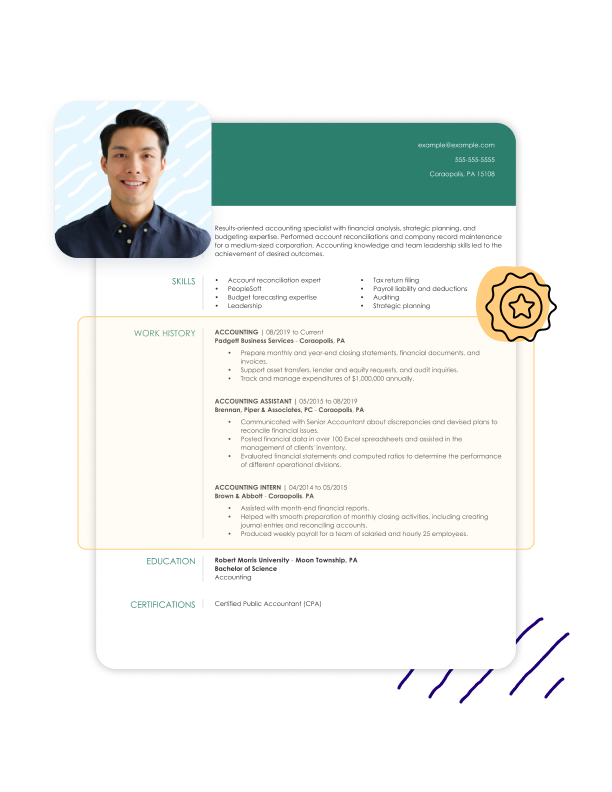To get your resume through an applicant tracking system (ATS) and into the hands of a recruiter, it must contain not only the right keywords but also compelling resume action words. Here, learn more about resume action verbs and how they can boost your resume. We will cover the following topics:
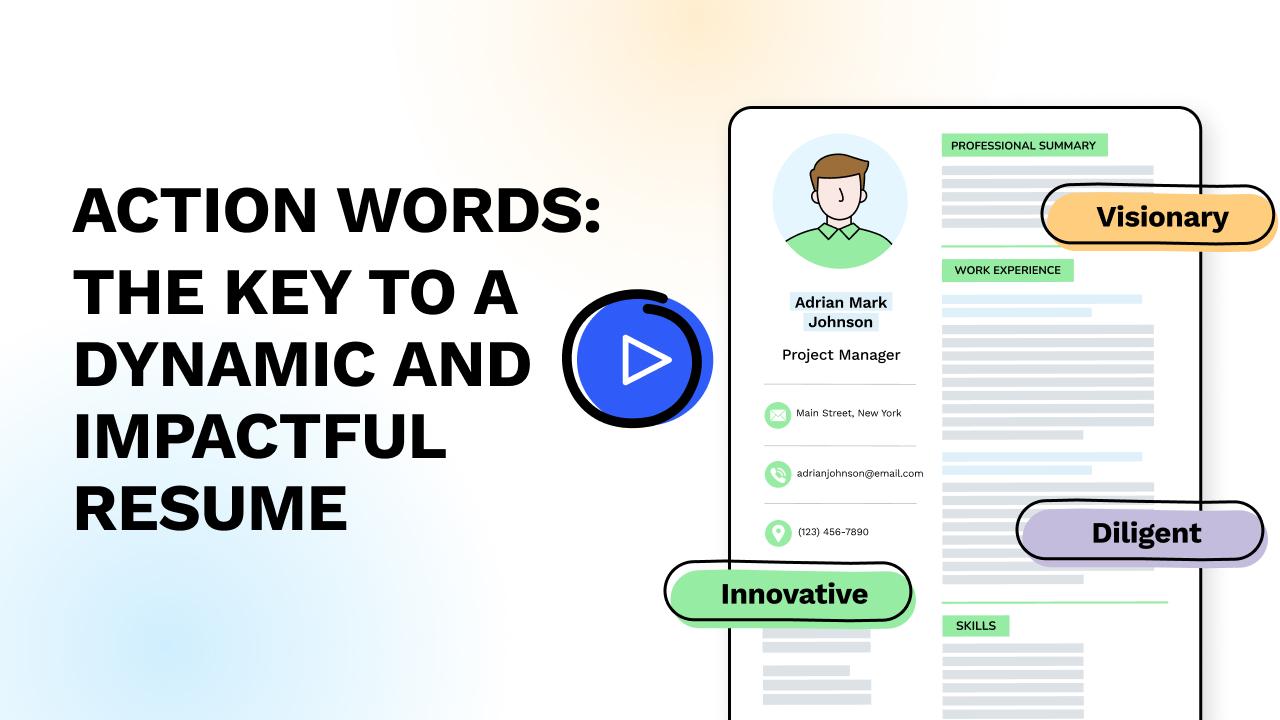
What are resume action words?
Resume action words describe the tasks you perform on the job. Also called resume power words, these words also describe the skills you use to get the job done.
It’s critical that you learn how to write a resume that utilizes compelling language to articulate your impact and get a recruiter’s attention. For a hiring manager who is reading dozens of resumes for a single job opening, reading resumes that use tired phrases like “responsible for” or “in charge of” gets dull. Instead, learn how to write a work experience section that uses eye-catching action words to stand out from the crowd and convince a potential employer to invite you for an interview. If you’re not sure where to start, check out the job listing and look for keywords that the employer uses to describe their ideal candidate. These keywords should inspire your word choice for your resume.
Choose from our premade resume templates and download your perfect resume today.
How to use resume action verbs to your advantage
Choosing the right resume action words can make even the most mundane work tasks sound fresh and exciting. Pair them with data and numbers to show recruiters the impact of work. Here’s how:
Why do good resume action words strengthen your resume?
Using strong language through resume action words will make your application stand out from the competition. Busy recruiters can sometimes read hundreds of resumes in a single day, so ditch boring, overused resume words when writing your professional summary, skills section and work experience. Avoiding generic terms can help persuade a recruiter to take a closer look at your credentials and increase your chances of landing a job interview. Choosing the right action words for your resume is an excellent way to ensure you outshine the competition.
How data and numbers increase the power of strong resume action verbs.
Resume action words describe the tasks you perform and the skills you use daily. To make them shine, you’ll also want to show the impact your work has had on the company. This is where data and numbers can boost the impact of already strong resume action words.
Consider which of these statements paints a more vivid picture:
- “Responsible for answering phone calls and greeting customers.”
- “Succeeded in answering up to 50 incoming calls daily while greeting dozens of in-store customers and directing their inquiries to the appropriate salesperson.”
If you chose the second statement, you’d be correct. The second bullet point not only states the day-to-day responsibilities of the applicant — taking calls and greeting customers — but also gives employers a sense of the traffic volume the job seeker handles daily. The combination of strong action verbs and numerical figures paints a vivid picture of the applicant’s abilities and experience, clearly showing that this applicant has a strong ability to multitask effectively.
Resume words to showcase skills and accomplishments
Choosing the right words to describe your skills and experience can be a bit overwhelming to some job seekers, but it doesn’t have to be. Below, we have provided a list of resume action words you can use to explain why you’re the right person for the role. A strong action verb is active rather than passive, showcasing the applicant’s initiative and impact. For more inspiration, or if you don’t find what you need on this resume action word list, look at our resume templates and resume examples to see how to do it properly.
Action verbs to explain work responsibilities
- Acted As
- Executed
- Negotiated
- Accomplished
- Completed
- Forged
- Created
- Navigated
- Undertook
- Operated
- Created
- Produced
- Completed
- Delivered
- Managed
Words to showcase your interpersonal or soft skills
- Insightful
- Genuine
- Attentive
- Compassionate
- Funny
- Professional
- Diligent
- Dedicated
- Self-starter
- Knowledgeable
- Curious
- Persuasive
- Reliable
- Competent
- Motivated
Action verbs that describe your communication skills
- Conveyed
- Moderated
- Negotiated
- Authored
- Informed
- Presented
- Persuaded
- Explained
- Illuminated
- Outlined
- Announced
- Disseminated
- Disclosed
- Broadcasted
- Circulated
Action verbs to highlight your technical skills
- Mastered
- Accelerated
- Fabricated
- Developed
- Rebuilt
- Assembled
- Merged
- Restored
- Recovered
- Standardized
- Launched
- Maintained
- Calculated
- Fine-tuned
- Finalized
Action words that demonstrate your creativity and vision
- Conceived
- Drafted
- Crafted
- Built
- Designed
- Overhauled
- Initiated
- Spearheaded
- Devised
- Established
- Invented
- Envisioned
- Reenvisioned
- Piloted
- Created
Action verbs that underscore management and leadership skills
- Managed
- Assigned
- Delegated
- Led
- Mentored
- Oversaw
- Trained
- Facilitated
- Created
- Designated
- Selected
- Orchestrated
- Planned
- Coordinated
- Directed
Action verbs for experience with finance and sales
- Negotiated
- Increased
- Gained
- Accelerated
- Saved
- Conserved
- Raised
- Boosted
- Delivered
- Yielded
- Maximized
- Improved
- Generated
- Lifted
- Delivered
Action verbs for when you improved something
- Reimagined
- Clarified
- Modernized
- Restructured
- Overhauled
- Customized
- Refined
- Digitized
- Integrated
- Merged
- Modified
- Redesigned
- Reorganized
- Streamlined
- Optimized
Action words for research and analysis skills
- Surveyed
- Tested
- Examined
- Tracked
- Interpreted
- Analyzed
- Forecasted
- Calculated
- Assessed
- Audited
- Measured
- Projected
- Mapped
- Identified
- Evaluated
Action verbs to describe collaboration
- Teamed up
- Gathered
- Participated
- Volunteered
- Joined
- Merged
- Interacted
- Recruited
- Assembled
- Consulted
- Cooperated with
- Associated with
- Allied with
- Partnered with
- Worked with
15 great resume synonyms
When building your resume, it is tempting to repeat certain words and phrases. After all, sometimes it feels impossible to avoid overusing common resume words like “managed,” “assisted,” “helped” and “led.”
To help you keep your resume readable and engaging, we’ve compiled a list of synonyms for “collaborate,” and other easy-to-overuse resume phrases. Even some of the strongest action verbs for resumes can wind up feeling robotic if they are used too much. So, to keep busy recruiters reading your resume content, concentrate on using engaging language to describe your skills and experience.
Avoid overused resume verbs and consider these resume synonyms instead:
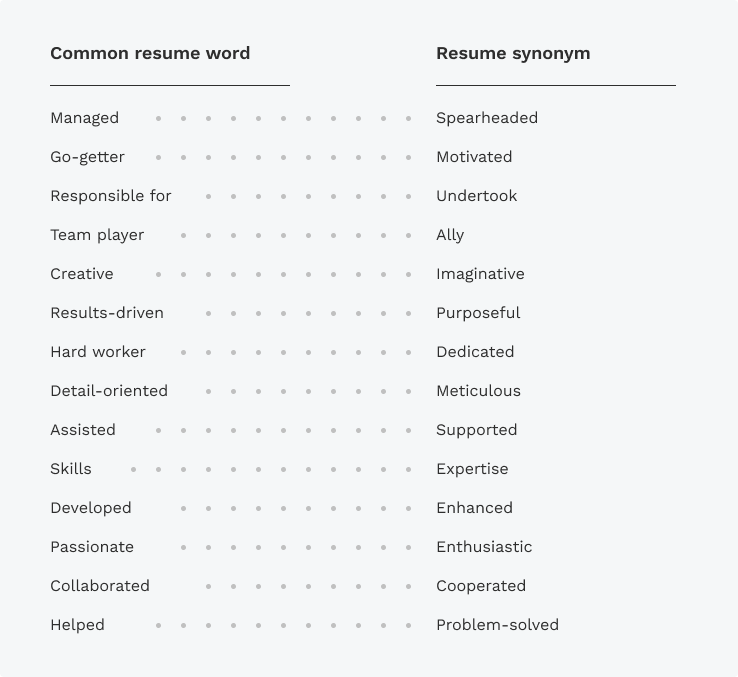
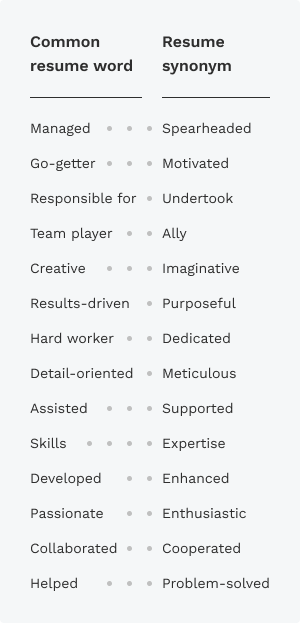
Add interesting resume adjectives
When you describe yourself as a worker, what are the words that you use? Does the skills section of your resume say things like “talented,” “efficient,” or “ambitious?” These are all adjectives and they play a major role in how you use a resume to characterize yourself and your skills. Including soft skills in the skills section of your resume is important, but not all resume soft skills are created equally.
The adjectives listed above are overused resume words. Part of what makes an adjective overused is how frequently job seekers add them to their resume. It’s also very easy to recycle the same few resume adjectives over and over again throughout your resume. You may not notice as you’re writing, but the result is a repetitive reading experience that doesn’t sell your qualifications as effectively as it could.
The best resume is one that communicates your candidacy in a way that is clear, concise and professional. Check out our list of impactful resume adjectives to use alongside your resume action words and verbs!
Resume adjectives for efficient workers
- Methodical
- Driven
- Organized
- Productive
- Industrious
- Studious
- Detailed
- Meticulous
- Precise
Resume adjectives for creative workers
- Imaginative
- Visionary
- Artistic
- Pioneering
- Original
- Innovative
- Enthusiastic
- Curious
- Inventive
Resume adjectives for leadership
- Decisive
- Accountable
- Diligent
- Diplomatic
- Thorough
- Attentive
- Assertive
- Confident
- Adaptable
Resume adjectives for educators
- Motivated
- Eager
- Uplifting
- Innovative
- Imaginative
- Communicative
- Resilient
- Stimulating
- Respectful
FAQ
Strong action words are any verbs that help paint a picture for a potential employer. Steer clear of overused resume buzzwords like, “responsible for” and be creative. Choose from our list of resume action words above, or use an online thesaurus to breathe life into the language of your resume. For auto-generated text suggestions for strong action words, use a professional resume builder.
Action words have three main functions on a resume:
- They introduce interesting language that will compel a hiring manager to continue reading your resume.
- They show the impact your work has had for a past employer.
- They can help energize and elevate even the most common or mundane job responsibilities.
When learning how to write a resume, follow these five tips:
- Include only the most relevant information for the role to which you are applying. Since resumes should be at most two pages, brevity and relevance are critical.
- Be sure to include a mix of both hard and soft skills. Technical skills are important but employers also look for candidates with skills like communication and collaboration since these competencies are difficult to teach.
- Use straightforward headers on your resume. It’s wise to stick to the basic sections, such as professional summary, work experience, skills and education to make it easy for recruiters to find what they are looking for.
- Use an easy-to-read resume template. Both applicant tracking systems and recruiters need to be able to easily scan your resume to determine whether you have the required skills and experience. A great template can help.
- Study resume examples for the job title you seek. To write a good resume, seeing examples of professionally written resumes will show you exactly what a strong resume should look like.
Was this information about 150+ Action Verbs, Synonyms And Adjectives For Your Resume helpful? Let us know!
Hailey is a career advice writer dedicated to helping job seekers excel in their careers.
More resources

Half of American Workers Doubt Wages Will Ever Catch Up to the Cost of Living
Resume Now s wage stagnation report shows that American worker...

How to Write a CV: The Ultimate Guide
Here is a complete and comprehensive guide to writing a CV ev...

Mental Health Resume: Examples & Templates
As a mental health professional your resume should highlight ...

Pest Control Resume: Examples & Templates
As a pest control professional your resume should highlight y...
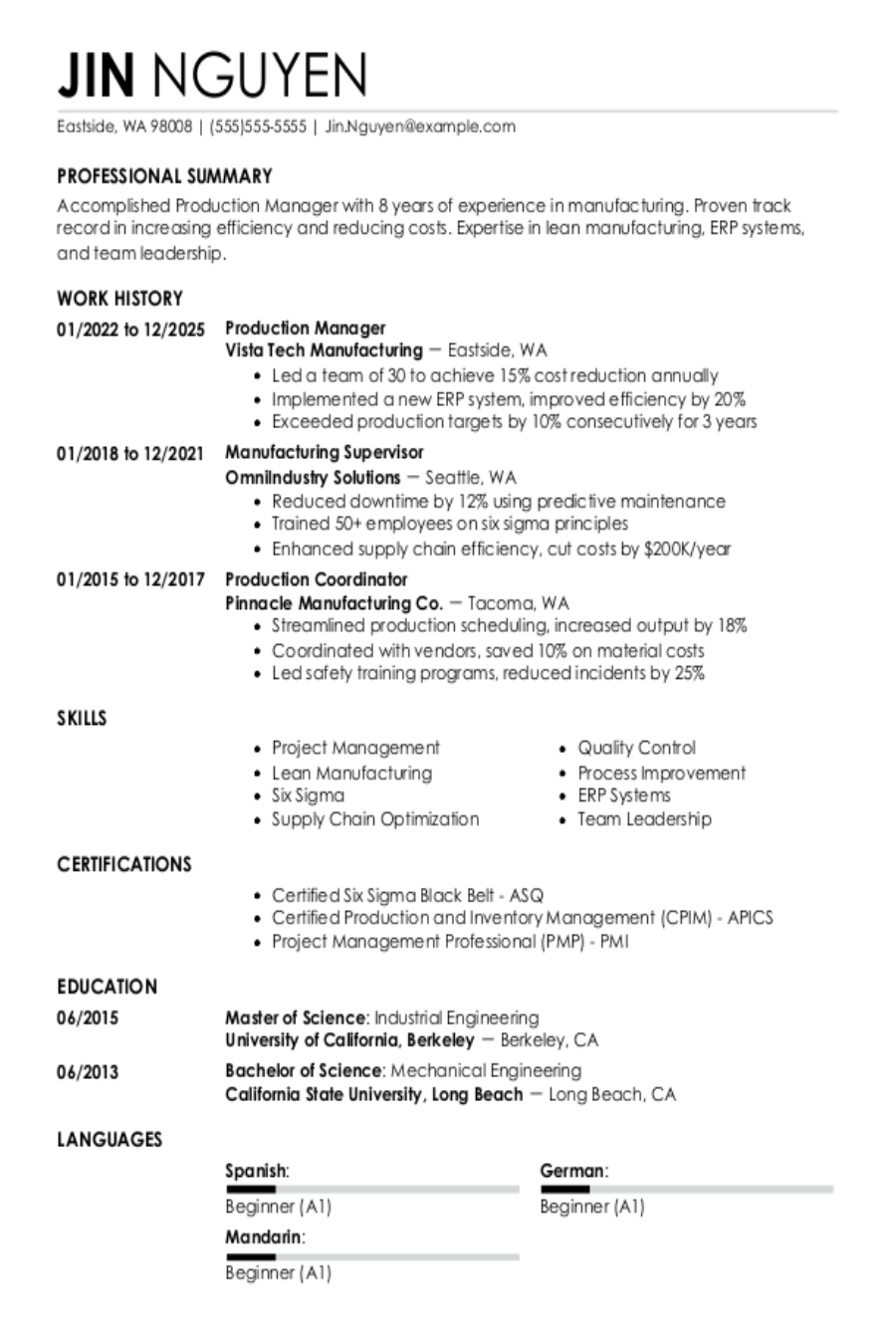
Interview-winning Production Resumes Examples and Tips
As a production professional crafting a resume that captivate...

